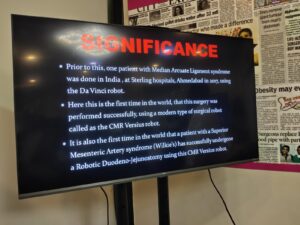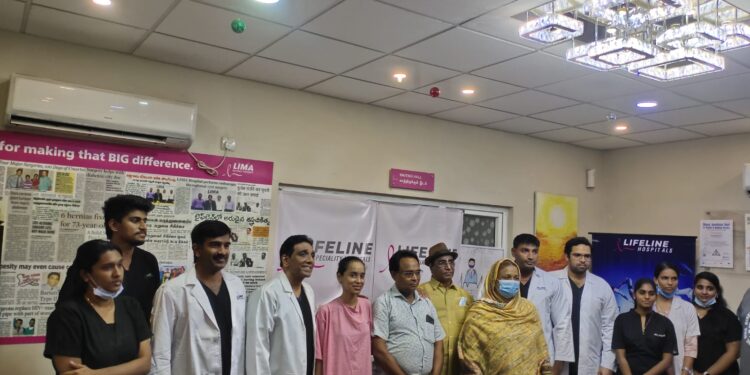CHENNAI, JULY 15

For the first time in the world , two women patients from far-flung West Bengal and Bangladesh with Median Arcuate Ligament Syndrom (MALS) and Compression of Duodenum (first part of small intestine) were treated successfully using the Versius California Medical Robot (CMR), said Dr J S Rajkumar, founder Chairman, Lifeline Multispecialty Hospitals, Chennai on Thursday.
Announcing the media, Dr Rajkumar said, “A middle-aged woman had abdominal pain and vomiting for the past three years, losing 15 kgs, she sought medical help. A series of investigations confirmed that she had a rare compression of a major blood vessel supplying the stomach and the first part of the gut. This is a case of Median Arcuate Ligament Syndrome (MALS). This artery is known as the coeliac artery. Her congenital disease (present at birth) had manifested itself at a later age and was threatening to become fatal by loss of nutrition.”

- About 10 cases have been reported all over the world using the da Vinci surgical system.
- The increased three-dimensional vision offered by the Versius, and multiple robotic arms, made this potentially difficult procedure much easier, giving much greater control to the surgeon: Dr JS Rajkumar.
The Versius robot from CMR Surgical is used by a team headed by Dr J S Rajkumar, Dr Anirudh, Dr Dharmendra with the assistance of renowned vascular surgeon Dr CMK Reddy.
Robotic release of all the compressing structures, along with the destruction of pain-giving nerve fibres and fibrous tissue in that area, was successfully performed.
The operation took about three hours, and the patient is doing exceedingly well in the postoperative period.
In another case, a 23-year-old woman from Bangladesh presented with recurrent vomiting of greenish bilious material. Extensive investigations had been done in Bangladesh. She was discovered to have compression of the duodenum (the first part of the small intestine) by a blood vessel known as the superior mesenteric artery.
Versius robot from CMR Surgical was used to free the first part of the intestine and join it with the small intestine below, a robotic Duodenojejunostomy. The patient is doing very well in the postoperative period.
Both these cases represent rare, potentially fatal maladies inside the abdomen.
Both were done for the first time in the world, using the Versius robot, by CMR Surgical.
About 10 cases have been reported all over the world using the da Vinci surgical system.
None have been reported before this in India using any robot, said Dr Rajkumar.
“The increased three-dimensional vision offered by the Versius, and multiple robotic arms, made this potentially difficult procedure much easier, giving much greater control to the surgeon,” said Dr JS Rajkumar.
“We hope to continue pushing the frontiers of complex surgery making use of the Versius robot.
Our experience with the Versius robot is now nearly 3 years, and we have had 100% success with every operation that we have utilized it for. Owing to our experience in advanced laparoscopic abdominal surgeries including laparoscopic metabolic surgery and several abdominal cancer surgeries, we have been able to perform these rare procedures with relative ease and comfort,’’ said Dr Anirudh, who assisted in this procedure.
“Gallbladder surgery, uterus surgery, Colo rectal surgery, anti-reflux or heartburn surgery, metabolic- bariatric surgery, and hernia surgery are the operations where we get tremendous benefit from using the CMR- Versius robot,’’ said Dr Dharmendra.
Other members of the surgical team include Dr Tasmia, Dr Nabeel, Dr Shreya, and Dr Jayakrishna. The anaesthesiologists were Dr Sampath, Dr Aarthi, and Dr Saravana Kumar.
Dr J S Rajkumar can be contacted through mail: jsr@llh.bz and Dr Anirudh Rajkumar: anigoko@yahoo.com












